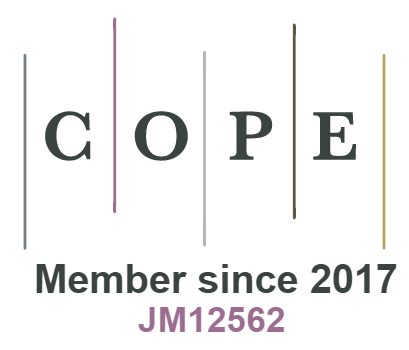The Impact of AI and Reciprocal Symmetry on Organizational Culture and Leadership in the Digital Economy
DOI:
https://doi.org/10.18034/ei.v6i2.703Keywords:
Artificial Intelligence (AI), Reciprocal Symmetry, Organizational Culture, Technological Disruption, Employee Engagement, Innovation, Change ManagementAbstract
The profound effects of reciprocal symmetry and artificial intelligence (AI) on leadership and organizational culture in the digital economy are examined in this study. Examining the impact of AI and reciprocal symmetry integration on leadership styles, workplace ethics, and organizational dynamics are among the main goals. Using a secondary data-based review process, the study synthesizes current literature, research papers, and empirical findings relevant to AI adoption and reciprocal symmetry principles in corporate environments. Significant findings show that AI technologies transform organizational culture, resulting in cultural shifts toward data-driven decision-making, innovation, and cooperation. Principles of reciprocal symmetry promote inclusive environments that highly value openness, justice, and respect for all parties involved. Ethical questions become increasingly important with policy ramifications that demand regulatory frameworks and moral norms to ensure responsible AI deployment and conformity with societal values. This study emphasizes ethical involvement, adaptive leadership, and teamwork when utilizing AI and reciprocal symmetry to promote favorable organizational and social outcomes in the digital economy. Organizations can manage AI adoption while promoting human-centric cultures and long-term value generation by adopting reciprocal symmetry principles.
Downloads
References
Ande, J. R. P. K., Varghese, A., Mallipeddi, S. R., Goda, D. R., & Yerram, S. R. (2017). Modeling and Simulation of Electromagnetic Interference in Power Distribution Networks: Implications for Grid Stability. Asia Pacific Journal of Energy and Environment, 4(2), 71-80. https://doi.org/10.18034/apjee.v4i2.720 DOI: https://doi.org/10.18034/apjee.v4i2.720
Carnero, M. C. (2017). Asymmetries in the Maintenance Performance of Spanish Industries Before and After the Recession. Symmetry, 9(8), 166. https://doi.org/10.3390/sym9080166 DOI: https://doi.org/10.3390/sym9080166
Gold, S., Reiner, G., & Dion, P. (2017). Data Envelopment Analysis for Investigating the Relative Efficiency of Supply Chain Management. Logistics Research, 10(1). https://doi.org/10.23773/2017_6
Grzesiuk, K. (2016). Unethical Behavior of Organizations from a Social Network Perspective: A Literature Review. Annales. Ethics in Economic Life, 19(4), 23-37. https://doi.org/10.18778/1899-2226.19.4.02 DOI: https://doi.org/10.18778/1899-2226.19.4.02
Ivanova-Gongne, M. (2015). Culture in Business Relationship Interaction: An Individual Perspective. The Journal of Business & Industrial Marketing, 30(5), 608-615. https://doi.org/10.1108/JBIM-01-2013-0002 DOI: https://doi.org/10.1108/JBIM-01-2013-0002
Khair, M. A. (2018). Security-Centric Software Development: Integrating Secure Coding Practices into the Software Development Lifecycle. Technology & Management Review, 3, 12-26. https://upright.pub/index.php/tmr/article/view/124
Mallipeddi, S. R., Goda, D. R., Yerram, S. R., Varghese, A., & Ande, J. R. P. K. (2017). Telemedicine and Beyond: Navigating the Frontier of Medical Technology. Technology & Management Review, 2, 37-50. https://upright.pub/index.php/tmr/article/view/118
Pieperhoff, M. (2018). The Explanatory Power of Reciprocal Behavior for the Inter-organizational Exchange Context. Sustainability, 10(6), 1850. https://doi.org/10.3390/su10061850 DOI: https://doi.org/10.3390/su10061850
Sandu, A. K., Surarapu, P., Khair, M. A., & Mahadasa, R. (2018). Massive MIMO: Revolutionizing Wireless Communication through Massive Antenna Arrays and Beamforming. International Journal of Reciprocal Symmetry and Theoretical Physics, 5, 22-32. https://upright.pub/index.php/ijrstp/article/view/125
Shajahan, M. A. (2018). Fault Tolerance and Reliability in AUTOSAR Stack Development: Redundancy and Error Handling Strategies. Technology & Management Review, 3, 27-45. https://upright.pub/index.php/tmr/article/view/126
Zhang, W-R., Peace, K. E., & Han, H-J. (2016). YinYang Bipolar Dynamic Organizational Modeling for Equilibrium-based Decision Analysis: Logical Transformation of an Indigenous Philosophy to a Global science. Asia Pacific Journal of Management: APJM, 33(3), 723-766. https://doi.org/10.1007/s10490-016-9480-1 DOI: https://doi.org/10.1007/s10490-016-9480-1
Downloads
Published
Issue
Section
License
Copyright (c) 2018 Sai Sirisha Maddula

This work is licensed under a Creative Commons Attribution-NonCommercial 4.0 International License.
Engineering International is an Open Access journal. Authors who publish with this journal agree to the following terms:
- Authors retain copyright and grant the journal the right of first publication with the work simultaneously licensed under a CC BY-NC 4.0 International License that allows others to share the work with an acknowledgment of the work's authorship and initial publication in this journal.
- Authors are able to enter into separate, additional contractual arrangements for the non-exclusive distribution of the journal's published version of their work (e.g., post it to an institutional repository or publish it in a book), with an acknowledgment of its initial publication in this journal. We require authors to inform us of any instances of re-publication.









